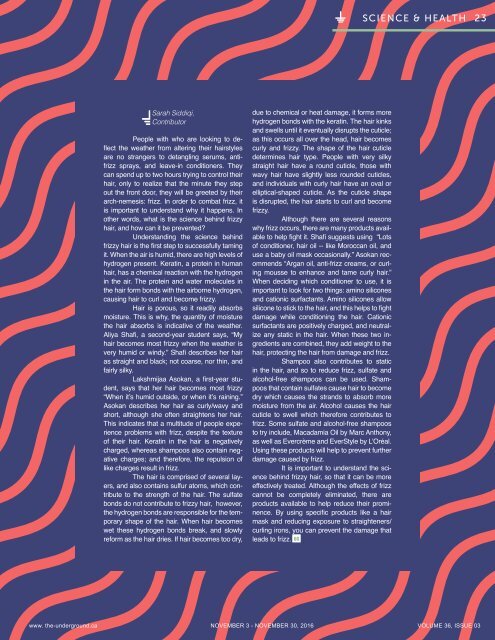Issue 03
You also want an ePaper? Increase the reach of your titles
YUMPU automatically turns print PDFs into web optimized ePapers that Google loves.
SCIENCE & HEALTH<br />
23<br />
Sarah Siddiqi,<br />
Contributor<br />
People with who are looking to deflect<br />
the weather from altering their hairstyles<br />
are no strangers to detangling serums, antifrizz<br />
sprays, and leave-in conditioners. They<br />
can spend up to two hours trying to control their<br />
hair, only to realize that the minute they step<br />
out the front door, they will be greeted by their<br />
arch-nemesis: frizz. In order to combat frizz, it<br />
is important to understand why it happens. In<br />
other words, what is the science behind frizzy<br />
hair, and how can it be prevented?<br />
Understanding the science behind<br />
frizzy hair is the first step to successfully taming<br />
it. When the air is humid, there are high levels of<br />
hydrogen present. Keratin, a protein in human<br />
hair, has a chemical reaction with the hydrogen<br />
in the air. The protein and water molecules in<br />
the hair form bonds with the airborne hydrogen,<br />
causing hair to curl and become frizzy.<br />
Hair is porous, so it readily absorbs<br />
moisture. This is why, the quantity of moisture<br />
the hair absorbs is indicative of the weather.<br />
Aliya Shafi, a second-year student says, “My<br />
hair becomes most frizzy when the weather is<br />
very humid or windy.” Shafi describes her hair<br />
as straight and black; not coarse, nor thin, and<br />
fairly silky.<br />
Lakshmijaa Asokan, a first-year student,<br />
says that her hair becomes most frizzy<br />
“When it’s humid outside, or when it’s raining.”<br />
Asokan describes her hair as curly/wavy and<br />
short, although she often straightens her hair.<br />
This indicates that a multitude of people experience<br />
problems with frizz, despite the texture<br />
of their hair. Keratin in the hair is negatively<br />
charged, whereas shampoos also contain negative<br />
charges; and therefore, the repulsion of<br />
like charges result in frizz.<br />
The hair is comprised of several layers,<br />
and also contains sulfur atoms, which contribute<br />
to the strength of the hair. The sulfate<br />
bonds do not contribute to frizzy hair, however,<br />
the hydrogen bonds are responsible for the temporary<br />
shape of the hair. When hair becomes<br />
wet these hydrogen bonds break, and slowly<br />
reform as the hair dries. If hair becomes too dry,<br />
due to chemical or heat damage, it forms more<br />
hydrogen bonds with the keratin. The hair kinks<br />
and swells until it eventually disrupts the cuticle;<br />
as this occurs all over the head, hair becomes<br />
curly and frizzy. The shape of the hair cuticle<br />
determines hair type. People with very silky<br />
straight hair have a round cuticle, those with<br />
wavy hair have slightly less rounded cuticles,<br />
and individuals with curly hair have an oval or<br />
elliptical-shaped cuticle. As the cuticle shape<br />
is disrupted, the hair starts to curl and become<br />
frizzy.<br />
Although there are several reasons<br />
why frizz occurs, there are many products available<br />
to help fight it. Shafi suggests using “Lots<br />
of conditioner, hair oil -- like Moroccan oil, and<br />
use a baby oil mask occasionally.” Asokan recommends<br />
“Argan oil, anti-frizz creams, or curling<br />
mousse to enhance and tame curly hair.”<br />
When deciding which conditioner to use, it is<br />
important to look for two things: amino silicones<br />
and cationic surfactants. Amino silicones allow<br />
silicone to stick to the hair, and this helps to fight<br />
damage while conditioning the hair. Cationic<br />
surfactants are positively charged, and neutralize<br />
any static in the hair. When these two ingredients<br />
are combined, they add weight to the<br />
hair, protecting the hair from damage and frizz.<br />
Shampoo also contributes to static<br />
in the hair, and so to reduce frizz, sulfate and<br />
alcohol-free shampoos can be used. Shampoos<br />
that contain sulfates cause hair to become<br />
dry which causes the strands to absorb more<br />
moisture from the air. Alcohol causes the hair<br />
cuticle to swell which therefore contributes to<br />
frizz. Some sulfate and alcohol-free shampoos<br />
to try include, Macadamia Oil by Marc Anthony,<br />
as well as Evercrème and EverStyle by L’Oréal.<br />
Using these products will help to prevent further<br />
damage caused by frizz.<br />
It is important to understand the science<br />
behind frizzy hair, so that it can be more<br />
effectively treated. Although the effects of frizz<br />
cannot be completely eliminated, there are<br />
products available to help reduce their prominence.<br />
By using specific products like a hair<br />
mask and reducing exposure to straighteners/<br />
curling irons, you can prevent the damage that<br />
leads to frizz.<br />
www. the-underground.ca NOVEMBER 3 - NOVEMBER 30, 2016<br />
VOLUME 36, ISSUE <strong>03</strong>












![[WEB]_ISSUE 06[EDIT3]_RachelChin](https://img.yumpu.com/58105406/1/190x245/web-issue-06edit3-rachelchin.jpg?quality=85)

